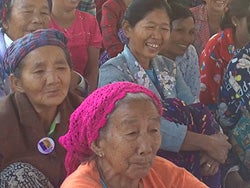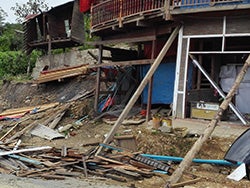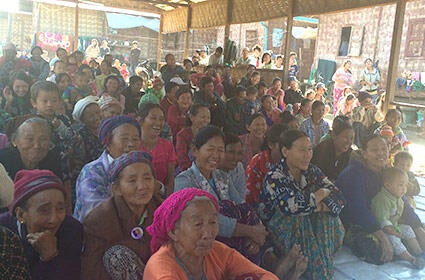Restoring and strengthening the provision of social and protection services in the aftermath of Myanmar's natural disaster is essential. Forced displacement (even temporary) leads to increased vulnerability of women and girls as a result of depleted coping mechanisms, a breakdown in social and familial support structures and increased psychosocial distress. In this environment women and girls require special protection as the risk of violence or the increase in pre-existing situations of violence is heightened.

UNFPA, as lead agency of the Gender Based Violence Sub Sector (GBVSS), which forms part of the larger humanitarian coordination structure in Myanmar, has responded by supporting BBC Media Action in the delivery of messages to women and girls to support the prevention of violations including trafficking, sexual exploitation and other forms of gender-based violence (GBV). BBC Media Action, through its community lifeline programme, included these GBV protection messages to ensure wide dissemination to people affected by the natural disaster. Mi Mi Thin Aung, UNFPA GBV National Coordinator, was interviewed and highlighted other needs that women and girls have beyond the immediate need for food, water and shelter. These messages were prepared in collaboration with all members of the GBVSS as a preparedness measure, with the guidance and support of UN OCHA and BBC Media Action. The messages were structured to both identify risk and provide support.

In addition to the delivery of messages by way of radio, Dr. Tay Zar Soe of UNFPA, who participated as a member of the MIRA team for Chin State, distributed the same key messages on GBV on ten vinyl posters to eight of the evacuation centres in Hakka through the Hakha Rescue Committee. Women and girls who were experiencing displacement and may not have had access to communication by way of radio were able to read and receive these messages. Mi Mi Thin Aung also disseminated these key messages with local organisations and women’s groups during the delivery of humanitarian assistance in Chin State. Messages for women and girls included: “If you are harmed, don’t stay silent”; “You or your children may be at risk of being hurt, exploited or trafficked”; and “Women, girls and children can stay safe by staying with their family”. Importantly, Dr Tay Zar Soe capitalised on his time as the UNFPA member of the MIRA team in Chin state by establishing a relationship with the Chin Women International Mission for future GBV activities.
In support of the response for women and girls to follow the key messages which are being disseminated, UNFPA has developed a pamphlet for distribution through shelter kits and dignity kits. At least 12,000 dignity kits will be distributed in the coming weeks. In addition a Psychosocial First Aid pamphlet for women and girls who have experienced violence has been produced by UNFPA in English and Myanmar for distribution to service providers including the Department of Social Welfare. Communication materials have also been distributed to donors and other service providers on the standard content of UNFPA’s dignity kits. Guidelines for Women and Girl’s Centres are currently being developed to support service providers in their response.


